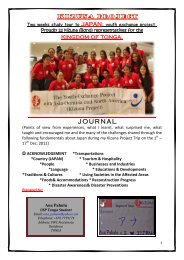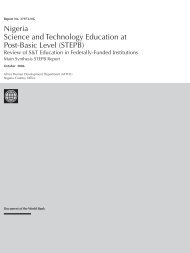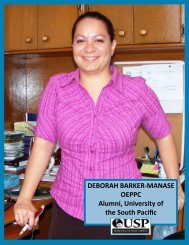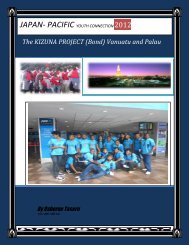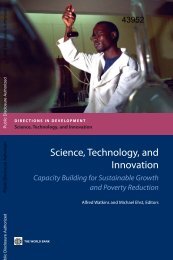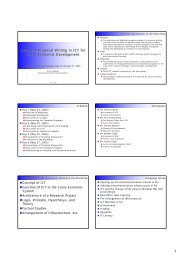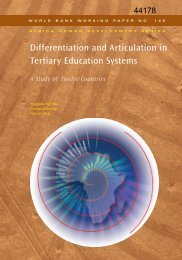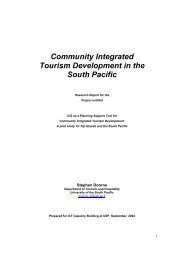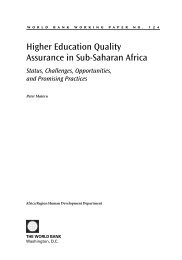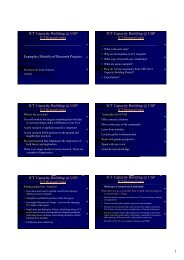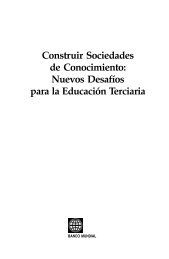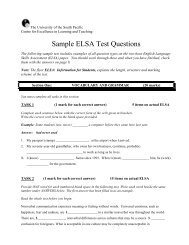our future, your future 2007 distance and flexible learning handbook
our future, your future 2007 distance and flexible learning handbook
our future, your future 2007 distance and flexible learning handbook
You also want an ePaper? Increase the reach of your titles
YUMPU automatically turns print PDFs into web optimized ePapers that Google loves.
alert. This depends on if you are an early<br />
morning person or if you feel more<br />
relaxed in the early evening or late<br />
at night. Obviously, this will also depend<br />
on what y<strong>our</strong> other commitments are <strong>and</strong><br />
the location at which you have chosen to<br />
study.<br />
- How do I plan my study time? Draw<br />
up a study schedule. If you have<br />
a daily or weekly plan for completing<br />
y<strong>our</strong> readings <strong>and</strong> assignments <strong>and</strong> then<br />
stick to the schedule, the workload will feel<br />
less overwhelming. Plan at least two weeks<br />
in advance. Two weeks is a long enough<br />
period to gauge y<strong>our</strong> progress, but not<br />
too far ahead that you can’t adapt the<br />
plan. To begin with itemise what you<br />
want to study each day, to cover the work<br />
set for the whole week. At the end of<br />
the two weeks, check to see if you have<br />
achieved y<strong>our</strong> goals before planning the<br />
next two weeks.<br />
• Before you begin a study period,<br />
review the work you achieved during<br />
y<strong>our</strong> last study session. Going over<br />
y<strong>our</strong> last session’s notes will refresh y<strong>our</strong><br />
memory at the same time as reinforce<br />
y<strong>our</strong> underst<strong>and</strong>ing of the information<br />
you have learnt. If you completed<br />
a practical exercise during y<strong>our</strong><br />
last session, rewrite the results as notes<br />
<strong>and</strong> highlight the observations you made.<br />
You may have started an assignment,<br />
so it might be useful to read it out<br />
loud <strong>and</strong> review if it is focused on<br />
the assignment question. Reviewing y<strong>our</strong><br />
last session’s work is valuable because<br />
you are reinforcing what you are <strong>learning</strong>.<br />
• Before you begin studying, decide what<br />
you intend to do for that study session.<br />
Set a defined amount of work that you<br />
wish to achieve <strong>and</strong> make it realistic<br />
for the time you have set aside. For<br />
example you may choose to spend one<br />
h<strong>our</strong> reading a set number of pages,<br />
or starting an assignment, or preparing<br />
some notes for a practical exercise. By<br />
setting h<strong>our</strong>ly or daily session goals, you<br />
will achieve more.<br />
• Keep up y<strong>our</strong> attendance at lectures,<br />
laboratories <strong>and</strong> tutorials. Even if you are<br />
given lecture notes, these will provide only<br />
part of the information you need to<br />
fully underst<strong>and</strong> the c<strong>our</strong>se; you<br />
need to attend the lecture <strong>and</strong> tutorials<br />
as well. Often a lecturer or tutor will let<br />
students ask further questions, which may<br />
result in the tutor or lecturer providing<br />
more information than what is supplied in<br />
the lecture notes.<br />
• When you watch lectures on a video<br />
monitor, you are forced to stare at the<br />
screen for long periods of time. There may<br />
also be wide variations in the quality<br />
of the video picture <strong>and</strong> sound. For these<br />
reasons, watching a lecture on video<br />
requires more concentration than being in<br />
a regular classroom.<br />
• During any type of lecture, make a<br />
habit of writing down any questions as you<br />
think of them. While you may not be able<br />
to communicate directly with y<strong>our</strong><br />
lecturer, during a lecture, you may get an<br />
opportunity to ask y<strong>our</strong> questions<br />
during an audio conference or via an online<br />
discussion sometime after the lecture.<br />
• If you haven’t used online <strong>learning</strong><br />
before, make sure you attend<br />
one of the training sessions held<br />
at the start of semester. This will<br />
help you develop the skills required<br />
to participate fully in the interactive<br />
portion of y<strong>our</strong> c<strong>our</strong>se. If you<br />
can’t attend the training session, ask<br />
about alternative arrangements. Make<br />
sure you access y<strong>our</strong> online <strong>learning</strong> early<br />
on in y<strong>our</strong> semester <strong>and</strong> keep accessing<br />
throughout the semester. The online<br />
<strong>learning</strong> management system is<br />
often used by lecturers <strong>and</strong> tutors to<br />
communicate vital announcements<br />
or additional c<strong>our</strong>se material. It will<br />
also help you keep in touch with y<strong>our</strong><br />
classmates around the region.<br />
• Make sure you regularly check with y<strong>our</strong><br />
local USP campus for changes to the dates<br />
<strong>and</strong> times of y<strong>our</strong> lectures, laboratory<br />
sessions <strong>and</strong> tutorials. Sometimes<br />
the dates <strong>and</strong> times of these sessions<br />
are changed at the last minute due to<br />
technical difficulties with the USPNet, or<br />
clashes with other c<strong>our</strong>ses.<br />
How do I learn through reading?<br />
As a DFL student, you will probably do most<br />
of y<strong>our</strong> <strong>learning</strong> through reading y<strong>our</strong> study<br />
materials, instead of listening to someone<br />
lecturing to you. Therefore, reading will be the<br />
most frequent activity you will be doing during<br />
y<strong>our</strong> studies. Indeed, reading may be a daily<br />
activity.<br />
Reading for study is very different from reading<br />
for pleasure. Reading for study means <strong>learning</strong>,<br />
underst<strong>and</strong>ing <strong>and</strong> retaining the information<br />
you read. Most students find the most effective<br />
reading technique is a three-stage process:<br />
survey reading, serious reading, <strong>and</strong> study<br />
reading.<br />
What is survey reading?<br />
The purpose of survey reading is to find out<br />
quickly what the main topic is <strong>and</strong> how the<br />
material is organised into sections or subsections.<br />
To survey read, follow these simple<br />
steps:<br />
1. Rapidly read the title, introductory<br />
paragraph <strong>and</strong> last paragraph(s) of the<br />
selected chapter or article, as these often<br />
summarise the main ideas communicated<br />
of the chapter or article.<br />
2. Read the headings <strong>and</strong> sub-headings. If<br />
there are none, then read the first sentence<br />
of each paragraph.<br />
3. Note any words highlighted by col<strong>our</strong>, bold<br />
or italic print.<br />
4. Take a quick look at illustrations, maps,<br />
diagrams, tables, figures <strong>and</strong> charts.<br />
Many USP c<strong>our</strong>ses also provide<br />
a schematic overview at the beginning of a<br />
section.<br />
What is serious reading?<br />
In the serious reading stage, you should get a<br />
deeper underst<strong>and</strong>ing of the main points, how<br />
the examples <strong>and</strong> explanations support these<br />
main points, <strong>and</strong> how the materials fit into y<strong>our</strong><br />
previous knowledge of the subject. To serious<br />
read, follow these simple steps:<br />
STUDYING BY DFL<br />
31<br />
STUDYING BY DFL USP



